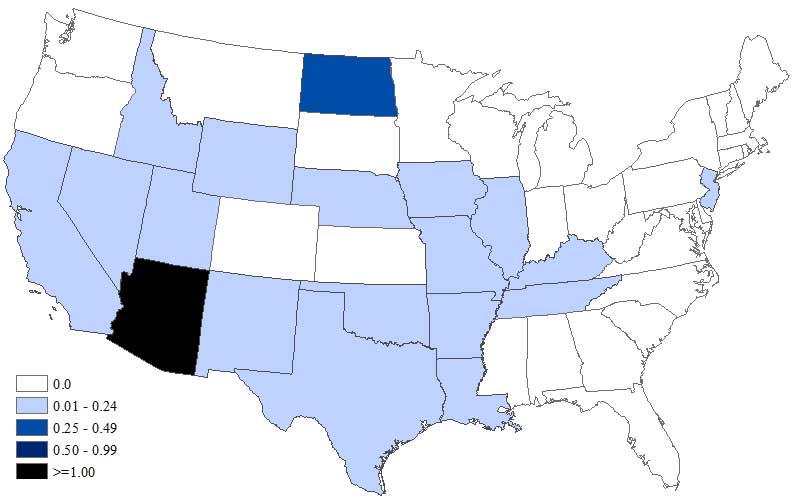Man's death linked to West Nile
Wylie: Results pending; daughter says he was ailing before diagnosis
12:00 AM CDT on Wednesday, October 19, 2005
By BILL LODGE / The Dallas Morning News
A Wylie man who died Saturday may be the first person to die from the West Nile virus in the Dallas-Fort Worth area this year, Collin County officials said Tuesday.
The man, identified by his family as John T. Phillips Jr., 78, spent three weeks at Medical Center of Plano before his death.
"Although preliminary lab reports indicated that this gentleman was not positive for WNV, lab results received today indicate otherwise," said Jamie Nicolay, the county's health educator. She said officials are not aware of another West Nile death this year.
Mr. Phillips' daughter, Gail Beltz, said Tuesday that her father was diagnosed as having the virus a week and a half ago. She received confirmation of the diagnosis from health officials Monday.
She said she thinks her father, who was already in poor health, was infected while planting bushes and watering shrubs at the home where he lived with his wife on Windsor Drive, just south of Lake Lavon.
"You just can't believe a mosquito bite can do this. It's just incomprehensible," Ms. Beltz said.
Ms. Nicolay said lab tests showed that Mr. Phillips had two West Nile antibodies – the state's requirement for declaring a case of the virus.
One Plano resident and one in Parker were diagnosed with West Nile this year. Both have fully recovered, Ms. Nicolay said.
Wylie officials said mosquitoes trapped in Mr. Phillips' neighborhood have not tested positive for the virus. They scheduled mosquito fogging from midnight until 5 a.m. today in four subdivisions – Kensington Manor, Harvest Bend, Pointe North and Meadowview estates.
Ms. Nicolay said infected mosquitoes have been trapped in Plano, McKinney, Richardson and unincorporated areas.
County officials said residents should eliminate standing water, use mosquito repellant that contains DEET and remain indoors at dusk and dawn, when mosquitoes are most active.
Most people who come in contact with West Nile do not have adverse reactions.
Researchers with the Centers for Disease Control and Prevention estimate that 80 percent of people infected with West Nile never develop noticeable illnesses.
Among those who do, however, about 0.75 percent develop life-threatening illnesses, such as encephalitis and meningitis, according to the CDC.
Staff writer Paul Meyer contributed to this report.
E-mail blodge@dallasnews.com
News Clips and Information on West Nile Virus Survivors. Videos and links to News Articles on West Nile Virus Families, West Nile Deaths, West Nile Virus Prevention and West Nile Virus Symptoms
Wednesday, October 19, 2005
Subscribe to:
Post Comments (Atom)
CDC West Nile Virus Info
Skip directly to page options Skip directly to A-Z link West Nile Virus Neuroinvasive Disease Incidence by State 2019 West Nil...

-
Teenage girl in Menifee dies after four-year battle with West Nile illness Download story podcast 10:00 PM PST on Wednesday, December 10...
-
Skip directly to page options Skip directly to A-Z link West Nile Virus Neuroinvasive Disease Incidence by State 2019 West Nil...
-
Tosa man battling West Nile dies Steiner was principal of Wauwatosa West High School By KAWANZA NEWSON knewson@journalsentinel.com Posted: N...

No comments:
Post a Comment